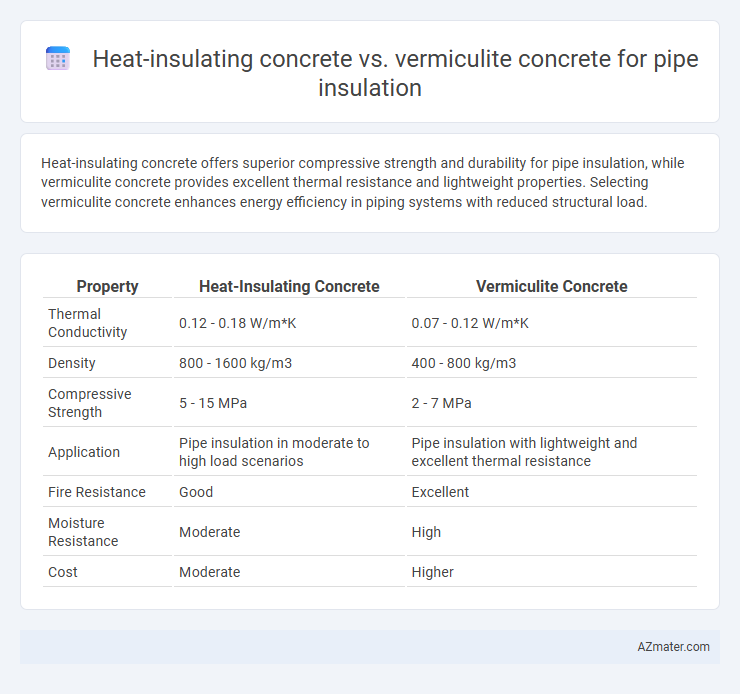Heat-insulating concrete offers superior compressive strength and durability for pipe insulation, while vermiculite concrete provides excellent thermal resistance and lightweight properties. Selecting vermiculite concrete enhances energy efficiency in piping systems with reduced structural load.
Table of Comparison
| Property | Heat-Insulating Concrete | Vermiculite Concrete |
|---|---|---|
| Thermal Conductivity | 0.12 - 0.18 W/m*K | 0.07 - 0.12 W/m*K |
| Density | 800 - 1600 kg/m3 | 400 - 800 kg/m3 |
| Compressive Strength | 5 - 15 MPa | 2 - 7 MPa |
| Application | Pipe insulation in moderate to high load scenarios | Pipe insulation with lightweight and excellent thermal resistance |
| Fire Resistance | Good | Excellent |
| Moisture Resistance | Moderate | High |
| Cost | Moderate | Higher |
Introduction to Pipe Insulation Materials
Heat-insulating concrete offers high thermal resistance and structural strength, making it suitable for pipe insulation in industrial settings where protection from mechanical damage is critical. Vermiculite concrete, composed of expanded vermiculite aggregates, provides excellent fire resistance and lightweight insulation, ideal for pipes requiring enhanced thermal efficiency without added weight. Both materials optimize energy conservation and temperature stability, with selection depending on application-specific thermal conductivity and durability requirements.
Understanding Heat-Insulating Concrete
Heat-insulating concrete offers superior thermal resistance and compressive strength, making it ideal for pipe insulation in industrial applications requiring both durability and energy efficiency. Unlike vermiculite concrete, which provides lightweight insulation primarily effective for moderate temperature ranges, heat-insulating concrete maintains structural integrity under high thermal stress and environmental exposure. Key components such as lightweight aggregates and specialized binders enhance the thermal conductivity and mechanical properties of heat-insulating concrete, optimizing it for long-term pipe insulation performance.
Vermiculite Concrete: Composition and Properties
Vermiculite concrete is a lightweight insulating material composed primarily of exfoliated vermiculite, Portland cement, and water, providing excellent thermal resistance and fireproofing properties. Its porous structure offers superior heat insulation compared to standard heat-insulating concrete, making it ideal for pipe insulation applications requiring high-temperature endurance and moisture resistance. The material's low density and non-combustible nature enhance energy efficiency and durability in industrial piping systems.
Thermal Performance Comparison
Heat-insulating concrete offers superior compressive strength and moderate thermal conductivity around 0.2 W/m*K, making it suitable for structural pipe insulation requiring load-bearing capacity. Vermiculite concrete exhibits lower thermal conductivity, typically between 0.06 to 0.12 W/m*K, providing enhanced thermal resistance and improved insulation performance in applications prioritizing heat retention. The choice between heat-insulating concrete and vermiculite concrete depends on balancing thermal insulation efficiency against mechanical strength for optimal pipe insulation solutions.
Weight and Density Differences
Heat-insulating concrete typically has a higher density, ranging from 1600 to 2000 kg/m3, resulting in increased structural weight, whereas vermiculite concrete is significantly lighter, with densities around 600 to 800 kg/m3, making it ideal for applications requiring reduced load. The lower density of vermiculite concrete arises from its exfoliated mineral content, providing enhanced thermal insulation without compromising strength for pipe insulation. Weight considerations play a critical role in selecting vermiculite concrete when minimizing dead load is essential in piping systems, while heat-insulating concrete suits situations where higher compressive strength is prioritized.
Fire Resistance Capabilities
Heat-insulating concrete offers moderate fire resistance with the ability to withstand temperatures up to 1100degC, making it suitable for general pipe insulation in industrial applications. Vermiculite concrete excels in fire resistance, tolerating temperatures exceeding 1200degC due to its lightweight, non-combustible mineral composition, providing superior protection against heat exposure and fire hazards. For high-temperature pipe insulation, vermiculite concrete is preferred for its enhanced thermal stability and excellent fire-resistant properties.
Installation Methods and Ease of Application
Heat-insulating concrete for pipe insulation requires careful mixing and placement, often involving heavy equipment and skilled labor to ensure proper density and thermal performance. Vermiculite concrete, characterized by its lightweight and granular structure, allows for easier handling and simpler installation, typically applied by spray or pour methods with minimal specialized tools. The ease of application with vermiculite concrete reduces labor time and effort, making it a preferred choice for complex pipe configurations and retrofit projects.
Longevity and Durability Factors
Heat-insulating concrete offers superior compressive strength and resistance to mechanical wear, ensuring long-term durability in pipe insulation applications. Vermiculite concrete excels in lightweight thermal insulation and fire resistance but may exhibit reduced structural integrity over extended periods. Choosing between the two depends on balancing the need for robust longevity against enhanced thermal performance in pipe insulation systems.
Environmental Impact and Sustainability
Heat-insulating concrete typically contains traditional cementitious materials with moderate embodied energy, while vermiculite concrete incorporates lightweight, naturally occurring vermiculite, reducing overall material consumption and thermal conductivity. Vermiculite concrete offers enhanced sustainability due to its natural mineral content, improved recyclability, and lower carbon footprint during production compared to conventional heat-insulating concrete. The use of vermiculite concrete in pipe insulation also promotes energy efficiency by providing superior thermal resistance, leading to reduced operational energy consumption and environmental impact over the product lifecycle.
Cost Analysis: Heat-Insulating vs Vermiculite Concrete
Heat-insulating concrete typically offers lower initial material costs compared to vermiculite concrete but may require more frequent maintenance due to lower durability. Vermiculite concrete, while having a higher upfront cost, provides superior thermal insulation and long-term cost savings through reduced energy expenditure and maintenance. Evaluating lifecycle costs reveals that vermiculite concrete delivers better value in applications demanding high-performance pipe insulation.

Infographic: Heat-insulating concrete vs Vermiculite concrete for Pipe insulation
 azmater.com
azmater.com